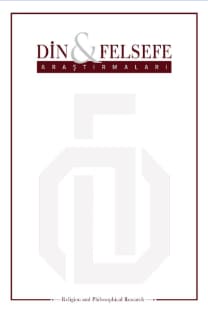Schellenberg Bağlamında İlahi Gizlilik Problemi ve Çeşitli Yaklaşımlar
İlahi gizlilik problemi, hem teist hem teist olmayan çevreler tarafından farklı şekillerde anlaşılmıştır. Ateolojik bir perspektiften, Tanrı’yı samimi ve makul bir şekilde arayıp da bulamayan insanların varlığı olarak vaz edilen ilahi gizlilik problemi ateizmi destekliyorken agnostisizm açısından aynı problem Tanrı’nın varlığı ve yokluğuna eşit derecede delil bulunduğu gerekçesiyle agnostisizmi desteklemektedir. Farklı dinlere mensup teistler bu problem karşısında çeşitli çözüm yolları üretmiştir. Örneğin, Tanrı’nın gizli olmasını insanlara iman etme özgürlüğü tanıdığı için gerekli gören teistik anlayışlar olduğu gibi Tanrı ile kişisel ilişki kurmanın ancak ilahi gizliliğin var olması ile mümkün olduğu da ileri sürülmüştür. Daha farklı bir girişim olarak Yahudilik’teki seçilmişlik öğretisi üzerinden de çözüm önerileri getirilmiştir. Bu makalede, söz konusu farklı yaklaşımları değerlendirdim. İlk bölümde ateolojik ve agnostik yaklaşımları özetle tanıtarak ilahi gizlilik probleminin imaları hakkında teist olmayan kamplar arasında bir uzlaşım olmadığına işaret ettim. İkinci bölümde teistik yaklaşımları ele aldım. Testik yaklaşımların problemi çözmeye çalışırken bir yandan da ürettikleri yeni problemler üzerinde durdum. Gizliliği hangi bağlamda anlayabileceğimizi sorguladıktan sonra ilahi gizlilik probleminin ortaya yeni bir şey koymadığını ve delil niteliği taşımadığını zira öncüllerindeki iddiaların herkes tarafından doğrulanabilir olmadığını göstermeye çalıştım. Sonuçta da karşıt bir argüman sunarak problemin askıya alınıp Tanrı’nın varlığını rasyonel bir zeminde tartışmamız gerektiğini ileri sürdüm.
Anahtar Kelimeler:
Din Felsefesi, Teizm, Ateizm, İlahi Gizlilik, Schellenberg
The Problem of Divine Hiddenness in The Context of Schellenberg and Different Approaches
The problem of divine hiddenness discussed among both theist and non-theist circles. From an atheistic perspective the existence of people who are sincerely looking for God but cannot reach Him is a supportive point for atheism. On the other side, same problem supports agnosticism since there are equal evidence from both side for the existence of God from an agnostic perspective. The theists who are belonging to different religion have tried to find some solutions to this problem. For instance; there is a theistic understanding which claims hiddenness of God provides us freedom to believe and another one says it is the only way to have personal relationship with God. A different position brings solution from the Jewish idea that chosen people of God. In this article, I have evaluated those different approaches. In the first section, I have indicated that there is no agreement on the implication of divine hiddenness problem even amongst non-theistic positions by shortly introducing atheistic and agnostic approaches. In the second section, I dealt with theistic approaches and the problems that they produced while trying to provide a solution to the problem. After an inquiry on how we are supposed to understand hiddenness, I have tried to show the problem has nothing new since premises of the divine hiddenness problem are not verifiable by everyone. As a conclusion I have offered postponing the divine hiddenness problem and discussing existence of God on a rational ground by presenting a counterargument.
Keywords:
Philosophy of Religion, Theism, Atheism, Schellenberg, Divine Hiddennes,
___
- Draper, Paul. “Seeking but not Believing: Confessions of a Practicing Agnostic”. Divine Hiddenness: New Essays. Ed. Daniel Howard-Snyder—Paul K. Moser. 197-214. Cambridge: Cambridge University Press, 2002.
- Erdem, Engin. “Ibn Sînâ’nın Metafizik Delili”. Ankara Üniversitesi İlahiyat Fakültesi Dergisi 52/1 (2011), 97-119.
- Evans, C. Stephen. “Can God be Hidden and Evident at the Same Time? Some Kierkegaardian Reflections”. Faith and Philosophy: Journal of the Society of Christian Philosophers 23/3 (2006), 241-253.
- Katar, Mehmet. “İsrail Kavminin Seçilmişliği Üzerine Bir Araştırma”. Journal of Islamic Research 20/2 (2007), 172-177.
- Kitab-ı Mukaddes. Erişim 18 Mayıs 2022. https://www.kitabimukaddes.com
- Kur’ân Yolu. Erişim 18 Mayıs 2022. https://kuran.diyanet.gov.tr
- Moser, Paul K. Why Isn't God More Obvious: Finding the God who Hides and Seeks. Alpharetta: RZIM, 2000.
- Pınar, Fatma. “Allah’ın Görülemeyeceği Görüşünün Temellendirilmesinde “el-Muğnî” Örneği”. Bülent Ecevit Üniversitesi İlahiyat Fakültesi Dergisi 6/2 (2019), 257-279.
- Plantinga, Alvin. "Pluralism: A Defense of Religious Exclusivism". The Rationality of Belief and the Plurality of Faith. Ed. Thomas D. Senor. 191-215. Ithaca: Cornell University Press, 1995.
- Reçber, Mehmet Sait. “The Metaphysics of Knowledge: A Quranic Perspective”. Beytulhikme An International Journal of Philosophy 9/9:3 (2019), 573-584.
- Ross, Jacob Joshua. “The Hiddenness of God – A Puzzle or a Real Problem?”. Divine Hiddenness: New Essays. Ed. Daniel Howard-Snyder—Paul K. Moser. 181-196. Cambridge: Cambridge University Press, 2002.
- Schellenberg, J. L. “Divine Hiddenness and Human Philosophy”. Hidden Divinity and Religious Belief: New Perspectives. Ed. Adam Green—Eleonore Stump. 13–32. Cambridge: Cambridge University Press, 2016.
- Schellenberg, J. L. Divine Hiddenness and Human Reason. Ithaca: Cornell University Press. 1993.
- Schellenberg, J. L. “Divine Hiddenness Justifies Atheism”. Contemporary Debates in Philosophy of Religion. Ed. Michael L. Peterson—Raymond J. VanArragon. 30-41. Oxford: Blackwell, 2003.
- Toprak, Bilal. Din Arkeolojisinin İmkânı ve Göbekli Tepe. İstanbul: İstanbul Üniversitesi, Sosyal Bilimler Enstitüsü, Doktora Tezi, 2019.
- Tucker, Chris. “Divine Hiddenness and the Value of Divine-Creature Relationships”. Religious Studies 44/3 (2008), 269–87.
- Türkben, Yaşar. İlahi Gizlilik. Ankara: Elis, 2018.
- Van Inwagen, Peter. “What is the Problem of the Hiddenness of God?”. Divine Hiddenness: New Essays. Ed. Daniel Howard-Snyder—Paul K. Moser. Cambridge: Cambridge University Press, 2002.
- Webb, Mark. “Religious Experience”. The Stanford Encyclopedia of Philosophy (2017). Ed. Edward N. Zalta. Erişim 06.06.2022.
- https://plato.stanford.edu/archives/win2017/entries/religious-experience/>. Zarepour, Mohammad Saleh. Necessary Existence and Monotheism: An Avicennian Account of the Islamic Conception of Divine Unity. Cambridge University Press, 2022.
- Yayın Aralığı: Yılda 2 Sayı
- Başlangıç: 2018
- Yayıncı: Din Felsefesi Derneği
Sayıdaki Diğer Makaleler
Realite: Bir Müşterinin Rehberi
Kelam İlmi, Analitik Gelenek ve Türkiye'de Din Felsefesinin Ehemmiyeti
Schellenberg Bağlamında İlahi Gizlilik Problemi ve Çeşitli Yaklaşımlar
Dinden Felsefeye Batı Nazariyatının Kökenleri Üzerine
Empirizm Merceğinden Dini İnanç Braithwaite Eleştirisi
Metodolojik Tabiatçılık Tartışmaları Bağlamında Gazali’nin Tabiî Nedensellik Eleştirisi
